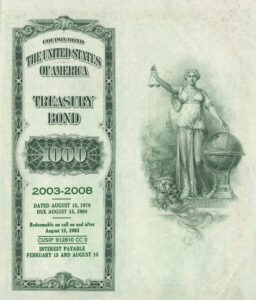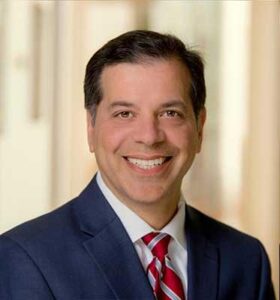 The U.S. government borrows money by selling Treasury bonds and other similar securities (“treasuries”). Much of the money it borrows in this way goes to the military, so people who do not want to help finance the military will want to avoid investing in such bonds.
The U.S. government borrows money by selling Treasury bonds and other similar securities (“treasuries”). Much of the money it borrows in this way goes to the military, so people who do not want to help finance the military will want to avoid investing in such bonds.
Earlier this year, a war tax resister contacted me. She was concerned about avoiding such bonds in her retirement account and was having a hard time finding good places to put her money. Even the so-called “socially responsible” exchange-traded funds and mutual funds seemed to include such bonds in their holdings.
Some Overseas Funds Screen Out Treasuries
She also pointed me to this Bloomberg article: “ESG Hardliners Blacklist $16 Trillion U.S. Treasuries Market”. According to that article, some European companies that specialize in socially-responsible investments avoid investing in U.S. government debt because of U.S. policies. Excerpt:
“ESG-dedicated investors would usually avoid or question investments in U.S. Treasuries,” said Rupini Deepa Rajagopalan, head of the ESG office at Berenberg, which oversees about 36.7 billion euros. She cited the death penalty, nuclear weapons, and the U.S.’s non-participation in global environmental accords, such as the Kyoto Protocol.
(“ESG” stands for “Environmental, Social, and Corporate Governance” which is one of the ways socially-responsible investing is described.)
Many Funds Use Treasury Bonds by Default
But my correspondent was frustrated when she reached out to an investment advisor in the United States who specializes in socially-responsible investing. That advisor told her, “I have heard your concern before, but U.S. Treasury debt is unfortunately practically impossible to 100% divest from, as it is used as a default holding for many funds when they have available cash.”
He gave the example of the Calvert Green Bond Fund which, while its focus is on environmentally-responsible “green” bonds, “likely has some exposure to U.S. Treasury debt.”
Coincidentally, more than half of my own retirement savings was invested in that very fund, so I was surprised and upset: I thought I had investigated whether that fund holds Treasury bonds before I chose to invest there.
How Can You Find Out What a Fund Invests In?
It’s something of a chore to find out what a fund invests in. If a socially-responsible fund has specific screening criteria that match what you care about, and you trust the fund managers to apply those criteria conscientiously, you can relax. But it is uncommon for U.S.-based socially-responsible funds to screen out U.S. Treasury debt. So if you want to make sure you are not inadvertently investing in treasuries, you may have to dig.
Every quarter, funds are supposed to issue a “Certified Shareholder Report” that lists the investments held by the fund at that time. This report is a public document, and if you are willing to battle the user interface at the Securities & Exchange Commission’s EDGAR tool, you can look it up on-line. Some of the reports are huge (I suffered a rare browser crash trying to look at one of them) but the data is there.
I skimmed some of these reports and found, for example, that the Vanguard FTSE Social Index Fund held about $1,240,000 in U.S. treasuries; the PIMCO Total Return ESG Fund about $282,931,000; the VALIC Company Ⅱ U.S. Socially Responsible Fund another $2,394,279.
But there are limits to the usefulness of these reports. For one thing, they represent the investments of the fund only at a particular point in time. By the time you read the report, there have probably been some changes. Since funds often use Treasury bonds as temporary reservoirs for excess cash, just because a fund had no such investments listed in its report doesn’t mean they never invest that way.
How Treasury Bonds May Hide in a Fund’s Holdings
 For another thing, a fund may invest in treasuries without investing in anything called “Treasury Bonds.” That’s how I overlooked the treasuries held by that Green Bond fund in my own retirement account. There were no Treasury bonds listed in the Certified Shareholder Report for that fund, but it did invest a significant amount of its assets in something called the “Calvert Cash Reserves Fund”—and as it turns out, that fund is chock-full of treasuries.
For another thing, a fund may invest in treasuries without investing in anything called “Treasury Bonds.” That’s how I overlooked the treasuries held by that Green Bond fund in my own retirement account. There were no Treasury bonds listed in the Certified Shareholder Report for that fund, but it did invest a significant amount of its assets in something called the “Calvert Cash Reserves Fund”—and as it turns out, that fund is chock-full of treasuries.
I found other examples like this, too: The Trillium ESG Global Equity Fund, for instance, invests three and a half million dollars in something called the “First American Government Obligations Fund” which is government debt top-to-bottom. A number of funds I looked into also had on their books “Repurchase Agreements” which were typically collateralized by U.S. bonds. There are probably other ways treasuries can hide, too, that I’m not clever enough to notice.
So to be really diligent, you have to start peeling the onion: looking not only at where a fund invests directly, but also at what additional funds it might invest in and what their investments look like. That’s a lot of work for an unsophisticated investor like me. I’d rather leave it to the professionals, at least if they’re already on the case.
I reached out to the press spokespeople for several U.S. companies that offer some of the most popular socially-responsible investment funds, to ask if any of their funds screen out investments in U.S. government debt, or, if not, if they have any advice for investors who don’t want to see their money invested in that way.
Eventide Says It Avoids Treasuries in Its Funds

Many of the companies declined to answer. I did get an encouraging answer from Julie Jarrett of Eventide Funds, a faith-based socially-responsible investment company based in the U.S.:
Under normal circumstances, we avoid U.S. Treasuries in our funds because there are some activities of the government that we do not want to facilitate (e.g. offensive warfare, or funding to clinics providing abortions). Because Treasuries are general funding vehicles, an investor does not know which department of the government is an end recipient of the funds.
In addition, our income-focused products seek to screen out municipal bonds if the “use of proceeds” funds a state agency that participates in services that are contrary to our values-based screens.
However, when I looked up the EDGAR filings for Eventide funds, I found that most of them seemed to have indirect investments in treasuries: Their Gilead Fund is partially invested in the treasuries-heavy First American Government Obligations Fund; and their Global Opportunities Fund, Healthcare & Life Sciences Fund, and Multi-Asset Income Fund are each partially invested in Fidelity Investments Money Market Fund which is about half-treasuries. Of the funds I reviewed, only their Limited-Term Bond Fund seemed treasuries-free.
When I asked Jarrett about this, she replied:
In order to comply with the rules and regulations of the SEC, the mutual fund complex that Eventide is a part of has a list of securities to manage short term liquidity… When it comes to all other investments that Eventide has discretion over, we try to avoid treasuries under normal circumstances…
But Parnassus Believes U.S. Treasuries Are Socially-Responsible
Joe Sinha of Parnassus Investments (also U.S.-based), on the other hand, told me their ESG research team decided against screening out treasuries:

Parnassus believes it’s acceptable to buy treasuries because, on balance after various inputs are considered, the federal government is responsible for many good activities, like helping fund retirements (i.e. social security), providing medical care, revenue for education, and even recently helping to fund the search for a cure for COVID or supplying emergency aid.
“Investing with values, or ESG investing, means aligning someone’s personal values with how a Fund is managed,” Sinha told me. “So, it really depends on each person’s perspective.”
I asked him what advice he had for investors who were having a hard time finding a fund that matches their values. “Some investors chose to select individual bonds, like green bonds or social bonds, but these come with specific credit risks.” That is to say: you can always assemble your own custom-made fund by picking and choosing stocks and bonds that match your values, but then you lose the advantages of professional attention to the quality of your portfolio.
Conclusion
It’s harder than it ought to be to avoid loaning the Pentagon money with your investments. If you’re lucky, you may be able to find funds that match your preferred investment strategy and social responsibility criteria, and that avoid treasuries. You could also do some careful research into funds that may just happen not to invest in treasuries, even if that is not an explicit screen they apply. If all else fails, and if you’re willing to put in the time, you can manually assemble an investment portfolio from individual stocks and bonds and other such investments that you have personally screened.
But unfortunately, you cannot assume that a “socially-responsible” mutual fund or exchange-traded fund—even one that explicitly screens out military contractors and weapons manufacturers—does not provide funding for war by extending credit to the Pentagon.
David Gross is the author of 99 Tactics of Successful Tax Resistance Campaigns. He blogs about tax resistance and related issues at The Picket Line.





David, Thanks for the excellent and well-researched article.
I know that this is something missing from CODEPINK’s search engine for discovering if a mutual fund holds military-type investments. I searched the mutual fund VFTAX in their search engine (https://weaponfreefunds.org/fund/vanguard-ftse-social-index-fund/VFTAX/weapon-investments/FSUSA003PD/F000011IZ5?screen=all). Their results stated that this mutual fund only has one weapons-related stock: DXC Technology. What the search engine failed to reveal was that the mutual fund also has almost $3 million in short-term treasury bonds called “U.S. Cash Management Bills” (https://investor.vanguard.com/mutual-funds/profile/portfolio/VFTAX/portfolio-holdings). So I guess that is something to be aware of when using the CODEPINK / As You Sow divest tool. (This fund actually has over twice as much invested in treasury bonds than in DXC.)
I recently tried to hand over more of my investing work to Vanguard’s personal advisors only to find out they couldn’t manage my money if I refused to have treasury investments. It was disappointing. Vanguard charges modest fees and I already have retirement funds with the company, so it seemed like a good option, but apparently the personal advisors won’t limit themselves to that degree. Now, thanks to this post, I know that even the Vanguard FTSE Social Index Fund isn’t a total win, which is a bummer. But I have looked up the Aspiration Redwood Fund, where I also have retirement money, in EDGAR and on As You Sow and nothing caught my eye there, so that’s good news (at least if I’m reading the info in EDGAR correctly).
How do war tax resisters manage to invest in anything? If I could overcome my distaste for capitalism in any form, I would consider it. But I also know that interest and earnings are reported to the IRS. Which is fine as far as that goes, except it does alert them to the location of funds. The same applies to bank accounts with interest… maybe people feel safer if the money is in an IRA, but I’m not sure the feeling is not misplaced. Just wondering.
I have a friend who took all of her retirement funds out and bought a house for a friend and the friend pays her a mortgage payment each month instead of paying a bank. I’m considering doing something like that.
I found this from the Domini Social Impact Fund, they place a full page ad on the back of The Nation every issue and also an ad in each Mother Jones Magazine supporting alternative journalism.
See below, Blessings, Gary Cavalier (Las Vegas Catholic Worker)
We don’t invest in Treasuries: As you can see on the previous page, a significant portion of the Fund’s benchmark is allocated to U.S. Treasury obligations. Our standards include a long-standing policy to exclude securities issued by the U.S. Department of the Treasury, primarily due to concerns about financing our nation’s nuclear weapons arsenal. Instead of investing in these general government obligations, the Fund invests in bonds issued by U.S. government agencies that serve purposes aligned with our goals and have similar risk/return characteristics to U.S. Treasuries.
We maintain a significant overweight to agencies and mortgages to support affordable housing: The Domini Impact Bond Fund seeks to improve access to housing through investments that fund agencies and programs supporting access to affordable mortgage credit and rental properties. In keeping with our commitment to increasing access to capital for those historically underserved, the Fund has, since its inception, maintained a substantial, long-term commitment to affordable housing. We view our investments in housing as a form of reallocation of capital away from U.S. Treasuries.
We evaluate corporate bonds on a case-by-case basis: Like the benchmark, the Domini Impact Bond Fund also allocates a portion of its portfolio to corporate credit, the majority of which is issued for general corporate purposes. However, we evaluate corporate issuers on a case-by-case basis, using the same social and environmental standards we use to evaluate companies for our equity funds. Corporate issuers are evaluated on their business model and stakeholder relations using our proprietary framework and industry-specific key performance indicators.
We maintain a significant overweight to municipal bonds: In addition to corporate credit, the Domini Impact Bond Fund maintains significant exposure to credit issued by state and local municipalities. We believe these investments offer unique opportunities to help fund purposes essential to meeting the basic needs of communities, such as health care, education, and infrastructure. In particular, we seek investments that help increase access to capital for those historically underserved by the mainstream financial community, create public goods for those most in need, and fill capital gaps left by current financial practice.
You can read more about how the Domini Impact Bond Fund supports communities, starting on page 43.